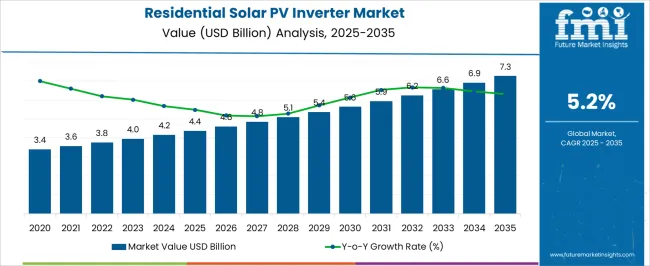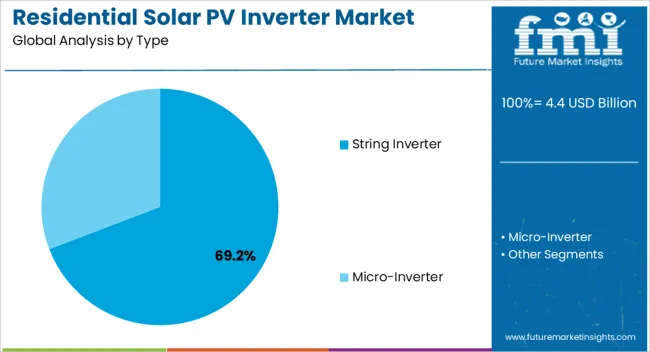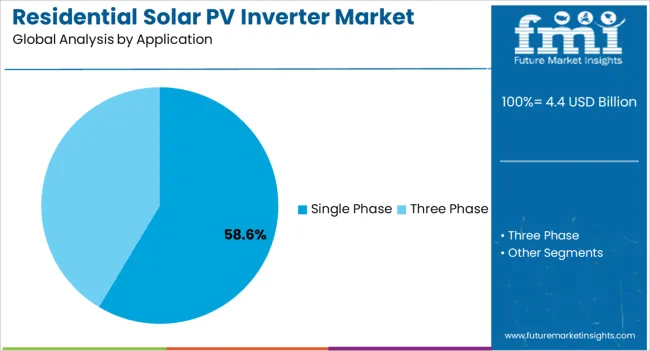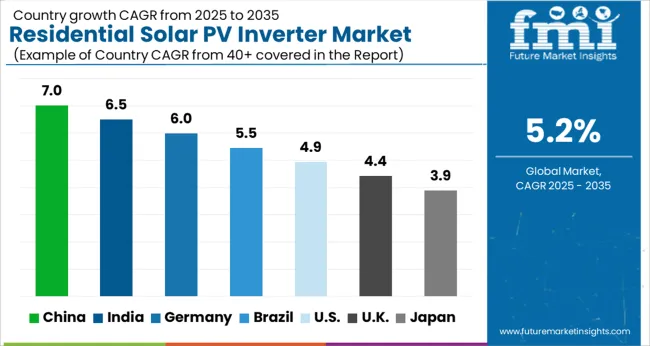The Residential Solar PV Inverter Market is estimated to be valued at USD 4.4 billion in 2025 and is projected to reach USD 7.3 billion by 2035, registering a compound annual growth rate (CAGR) of 5.2% over the forecast period.

| Metric | Value |
|---|---|
| Residential Solar PV Inverter Market Estimated Value in (2025 E) | USD 4.4 billion |
| Residential Solar PV Inverter Market Forecast Value in (2035 F) | USD 7.3 billion |
| Forecast CAGR (2025 to 2035) | 5.2% |
The residential solar PV inverter market is expanding steadily due to rising adoption of renewable energy solutions, declining solar module costs, and supportive government incentives for household solar installations. Growing concerns around energy independence and carbon footprint reduction have encouraged homeowners to adopt rooftop solar systems.
Technological advancements in inverter efficiency, remote monitoring capabilities, and integration with energy storage systems are further enhancing market penetration. Policies promoting net metering and decentralized energy production are also accelerating residential adoption.
The outlook remains positive as digitalization, grid modernization, and increasing consumer awareness around sustainable energy consumption continue to create strong growth opportunities for residential solar PV inverters across both developed and emerging regions.

The string inverter segment is expected to capture 69.20% of total revenue by 2025 within the type category, establishing itself as the dominant segment. This growth is driven by its cost effectiveness, ease of installation, and suitability for residential rooftop systems.
The ability of string inverters to manage multiple panels connected in series has made them highly attractive for household solar applications. Their reliability and relatively low maintenance requirements have also contributed to strong adoption.
Integration with digital monitoring platforms and compatibility with smart home systems further strengthen their market position. As residential consumers prioritize affordability and efficiency, the demand for string inverters continues to expand, reinforcing their leading share in the market.

The single phase segment is projected to hold 58.60% of market revenue by 2025 under the application category, making it the leading segment. This dominance is attributed to the prevalence of single phase electricity supply in residential settings, which aligns seamlessly with inverter design.
Single phase inverters are valued for their compactness, user friendliness, and cost advantages, making them highly suitable for small to medium scale solar installations. Their compatibility with household energy consumption patterns has accelerated their adoption in urban and suburban regions.
Moreover, advancements in efficiency and monitoring features have enhanced their performance reliability. With the growing residential demand for grid connected solar solutions, the single phase segment is positioned to retain its market leadership.
Solar PV inverter demand has been steadily increasing over the last few years. The growing environmental concerns about greenhouse emissions and the relevance of solar and other renewable energy sources in reducing these emissions.
As the cost of fossil fuels rises, solar electricity becomes a more cost-effective energy source. In addition, solar PV inverter costs have decreased in recent years, making them more accessible to the general public. As a result, there has been a significant increase in the installation of solar power systems in both established and developing countries across the world.
Other factors propelling the residential solar PV inverter industry include the demand for rural electrification, technical improvements, rising government backing, and increased renewable energy investments.
The increased demand for solar equipment has put a lot of strain on testing companies. Like Underwriters Laboratories, to ensure solar PV inverter security and keep up with technological advancements. However, residential solar PV inverter market development has been hampered by a lack of awareness. Moreover, the high cost of infrastructural improvements and recent government payment reductions on solar panels in the Asia Pacific area.
The lack of auxiliary technologies is a crucial impediment to market expansion. Nonetheless, increased environmental concerns about energy generation from traditional sources. Such as coal and natural gas are expected to provide an opportunity for the solar PV inverter industry.
Expanding the deployment of solar PV inverters to strengthen the microgrid network. Additionally, phasing out conventional storage technologies is anticipated to energize the business dynamics. Significant modifications and enhancements to current procedures, along with cost-competitiveness, are projected to have a beneficial effect on industry dynamics.
Residential solar PV inverter solutions account for two-thirds of the industry's distributed photovoltaic capacity. This can be attributed to the widespread acceptance of renewable energy sources in the housing sector and the growth of net metering schemes.
Smart communication ensures network dependability in conjunction with an equilibrium of electrical demand and supply. Smart communication is projected to stimulate residential solar PV inverter adoption.
Increasing regulatory concerns about the effectiveness of grid-tied solar installations are expected to encourage the adoption of string-based household solar PV inverter systems.
Following paradigm changes are likely to continue to affect the corporate landscape:
Historical Figures Vs Forecast Figures
| 2020 | USD 3,158.71 million |
|---|---|
| 2025 | USD 3,955.1 million |
| 2025 | USD 3,781.2 million |
| 2035 | USD 6,566.3 million |
As per FMI estimates, the market is projected to showcase a 5.2% CAGR between 2025 and 2035. In the historical period, the market grew at 4.6% CAGR.
The demand for renewable energy is going up because more people are using electricity, and the cost of making renewable energy is going down. This is going to help in the solar PV inverter market growth during the forecast period. The cost of making renewable energy has gone down a lot in recent years, so it is now a good option for people who need more electricity.
Due to favorable government programs, the market for solar PV inverters is projected to grow. People around the world are working to improve the quality of their lives by building more infrastructure in their countries. The government of the United Arab Emirates, for example, focuses a lot on the Smart Dubai project. This project aims to make Dubai the world's smartest city. Such booming construction activities are expected to elevate the solar PV inverter market.
Solar PV inverters are pushed even more by the rise in greenhouse gas emissions and environmental problems. The solar PV inverter market is expected to grow as more people learn about global warming.
Many companies in the solar PV inverter market are getting into artificial intelligence and machine learning, as well as other smart-energy fields. This, in turn, is expected to help the solar PV inverter market expand further.
People are increasingly using solar energy to power their homes, appliances, and other things. Due to this, the residential section of the solar PV inverter market is expected to grow a lot over the next few years. Increasing the use of renewable energy sources and enforcing efficient energy use rules are projected to help the business thrive.
The global and domestic participants in the industry have had a big impact on the way the industry works. It is projected to be easier for people to use the product if there are more regulations and people want to use a more efficient PV system inverter. The cost of solar panels is projected to go down because more parts can be made, and primitive technology is being used to make them more efficient.
| Year | Market Size |
|---|---|
| 2025 | USD 4,377.12 million |
| 2035 | USD 5,096.08 million |
| 2035 | USD 6,566.3 million |
| Category | Type |
|---|---|
| Top Segment | Micro-inverter |
| Market Share (2025) | 43% |
| Category | Application |
|---|---|
| Top Segment | Three Phase |
| Market Share (2025) | 59% |
Three-phase Segment to Account for Sizeable Market Share
| Segment | Three Phase |
|---|---|
| Market Share (2025) | 59% |
| Market Size (2025) | USD 2,333.51 million |
| Market Size (2035) | USD 3,874.12 million |
The three-phase sector has the prominent revenue share and is expected to continue dominating over the forecast period. This rise is related to the electricity generating, distribution, and transmission sectors.
Large commercial & industrial, and utility PV power plants have grown in scale. This can be credited to the increasing preference for 1,000-volt to 1,500-volt solar arrays. Thus, supporting the three-phase solar PV inverters market growth throughout the projection period.
| Segment | Micro-inverter |
|---|---|
| Market Share (2025) | 43% |
| Market Size (2025) | USD 1,700.69 million |
| Market Size (2035) | USD 2,823.50 million |
The micro-inverter segment dominated the market by product type, and this dominance is projected to continue. The segment is projected to acquire a total of 43% over the forecast period. Micro-inverters are compact and portable, containing core elements of central inverters. Due to their high performance and compact size, micro-inverters are increasingly used in diverse applications.
From 2025 to 2035, significant industrialization and renewable energy infrastructure expansion is projected to be witnessed. This is projected to considerably take place in rising nations like China, India, Japan, and others, thus driving the demand for micro-inverters.

Market Evaluation: Computed Residential Solar PV Inverter Market Share and Size
| Country | The United States |
|---|---|
| Value Share (2025) | 23% |
| Market Size (2025) | USD 909.67 million |
| Market Size (2035) | USD 1,510.25 million |
| Country | Germany |
|---|---|
| Value Share (2025) | 3.6% |
| Market Size (2025) | USD 142.38 million |
| Market Size (2035) | USD 236.39 million |
| Country | Japan |
|---|---|
| Value Share (2025) | 5.8% |
| Market Size (2025) | USD 229.39 million |
| Market Size (2035) | USD 380.8 million |
| Country | Australia |
|---|---|
| Value Share (2025) | 1.5% |
| Market Size (2025) | USD 59.33 million |
| Market Size (2035) | USD 98.49 million |
| Country | Forecast CAGR (2025 to 2035) |
|---|---|
| China | 6.4% |
| India | 6.9% |
| The United Kingdom | 3.5% |
The Asia Pacific captured a significant revenue share of the solar PV inverters market in 2025 and is expected to observe increasing sales during the forecast period. This is due to the region's existence of significant players and a sizable customer base.
Factors expected to fuel the residential solar PV inverter industry growth in the future years:
The global market is fragmented. ABB Ltd, Schneider Electric SE, Siemens AG, Mitsubishi Electric Corporation, and Omron Corporation are the market's leading companies. Some recent market developments in the residential solar PV inverter industry include:
Over the long run, top players in the market are considering various tactics to ensure they grab a huge share of the entire market. These include contracts, inorganic growth ventures, and new product innovations. For instance, in March 2025, Delta introduced new solar inverter series for commercial and residential PV. This new in-series product can achieve an efficiency of 98.7%, in addition to the European efficiency rating of 98.5%. Its power spans from 15 to 20kW.
Suppliers of residential solar PV inverter solutions are also finding great opportunities in the Asia Pacific region. Owing to the large customer pool in the region, suppliers are considering scaling their businesses in developing countries. Increasing investment to change aged power infrastructure with modern is also pushing business growth.
Vendors can also take advantage of subsidies and favorable government policies in Europe. Due to these initiatives, consumers are investing in renewable sources. Additionally, companies can develop high-tech inverters to upscale their business over the forecast period.
Advertisement of clean energy sources to achieve a clean energy economy can also help businesses to increase their sales. This may help stimulate sales of the product among the discerning population.
| Attribute | Details |
|---|---|
| Forecast Period | 2025 to 2035 |
| Historical Data Available for | 2020 to 2025 |
| Market Analysis | USD million for Value |
| Key Countries Covered | The United States, Canada, Mexico, Brazil, Peru, Argentina, Chile, Colombia, Rest of Latin America, Germany, Italy, France, the United Kingdom, Spain, India, GCC, South Africa, Japan, China, South Korea, etc. |
| Key Regions Covered | North America; Latin America; the Asia Pacific; Europe; the Middle East; and Africa |
| Key Segments Covered | Type, Application, and Region |
| Key Companies Profiled | ABB Ltd; Schneider Electric SE; Siemens AG; Mitsubishi Electric Corporation; and Omron Corporation |
| Report Coverage | Market Forecast, Company Share Analysis, Competition Intelligence, DROT Analysis, Market Dynamics and Challenges, and Strategic Growth Initiatives |
| Customization and Pricing | Available upon Request |
The global residential solar pv inverter market is estimated to be valued at USD 4.4 billion in 2025.
The market size for the residential solar pv inverter market is projected to reach USD 7.3 billion by 2035.
The residential solar pv inverter market is expected to grow at a 5.2% CAGR between 2025 and 2035.
The key product types in residential solar pv inverter market are string inverter and micro-inverter.
In terms of application, single phase segment to command 58.6% share in the residential solar pv inverter market in 2025.






Our Research Products

The "Full Research Suite" delivers actionable market intel, deep dives on markets or technologies, so clients act faster, cut risk, and unlock growth.

The Leaderboard benchmarks and ranks top vendors, classifying them as Established Leaders, Leading Challengers, or Disruptors & Challengers.

Locates where complements amplify value and substitutes erode it, forecasting net impact by horizon

We deliver granular, decision-grade intel: market sizing, 5-year forecasts, pricing, adoption, usage, revenue, and operational KPIs—plus competitor tracking, regulation, and value chains—across 60 countries broadly.

Spot the shifts before they hit your P&L. We track inflection points, adoption curves, pricing moves, and ecosystem plays to show where demand is heading, why it is changing, and what to do next across high-growth markets and disruptive tech

Real-time reads of user behavior. We track shifting priorities, perceptions of today’s and next-gen services, and provider experience, then pace how fast tech moves from trial to adoption, blending buyer, consumer, and channel inputs with social signals (#WhySwitch, #UX).

Partner with our analyst team to build a custom report designed around your business priorities. From analysing market trends to assessing competitors or crafting bespoke datasets, we tailor insights to your needs.
Supplier Intelligence
Discovery & Profiling
Capacity & Footprint
Performance & Risk
Compliance & Governance
Commercial Readiness
Who Supplies Whom
Scorecards & Shortlists
Playbooks & Docs
Category Intelligence
Definition & Scope
Demand & Use Cases
Cost Drivers
Market Structure
Supply Chain Map
Trade & Policy
Operating Norms
Deliverables
Buyer Intelligence
Account Basics
Spend & Scope
Procurement Model
Vendor Requirements
Terms & Policies
Entry Strategy
Pain Points & Triggers
Outputs
Pricing Analysis
Benchmarks
Trends
Should-Cost
Indexation
Landed Cost
Commercial Terms
Deliverables
Brand Analysis
Positioning & Value Prop
Share & Presence
Customer Evidence
Go-to-Market
Digital & Reputation
Compliance & Trust
KPIs & Gaps
Outputs
Full Research Suite comprises of:
Market outlook & trends analysis
Interviews & case studies
Strategic recommendations
Vendor profiles & capabilities analysis
5-year forecasts
8 regions and 60+ country-level data splits
Market segment data splits
12 months of continuous data updates
DELIVERED AS:
PDF EXCEL ONLINE
Residential Generator Market Size and Share Forecast Outlook 2025 to 2035
Residential Energy-Efficient Technologies Market Size and Share Forecast Outlook 2025 to 2035
Residential Interior Wood Doors Market Size and Share Forecast Outlook 2025 to 2035
Residential Air-to-Air Heat Pump Market Size and Share Forecast Outlook 2025 to 2035
Residential Automatic Motor Starter Market Size and Share Forecast Outlook 2025 to 2035
Residential AMI Gas Meter Market Size and Share Forecast Outlook 2025 to 2035
Residential Vacuum Circuit Breaker Market Size and Share Forecast Outlook 2025 to 2035
Residential Non-metal Electrical Conduit Market Size and Share Forecast Outlook 2025 to 2035
Residential Carpet Roll Market Size and Share Forecast Outlook 2025 to 2035
Residential Air Insulated Power Distribution Component Market Size and Share Forecast Outlook 2025 to 2035
Residential Electrical Conduit Market Size and Share Forecast Outlook 2025 to 2035
Residential Energy Efficient Windows Market Size and Share Forecast Outlook 2025 to 2035
Residential Electric Underfloor Heating Market Size and Share Forecast Outlook 2025 to 2035
Residential Water Treatment Devices Market Size and Share Forecast Outlook 2025 to 2035
Residential Air to Water Heat Pump Market Size and Share Forecast Outlook 2025 to 2035
Residential Heat Pump Market Size and Share Forecast Outlook 2025 to 2035
Residential Hydronic Underfloor Heating Market Size and Share Forecast Outlook 2025 to 2035
Residential Electric Boiler Market Size and Share Forecast Outlook 2025 to 2035
Residential Smart Gas Meter Market Size and Share Forecast Outlook 2025 to 2035
Residential Energy as a Service (EaaS) Market Size and Share Forecast Outlook 2025 to 2035

Thank you!
You will receive an email from our Business Development Manager. Please be sure to check your SPAM/JUNK folder too.
Chat With
MaRIA